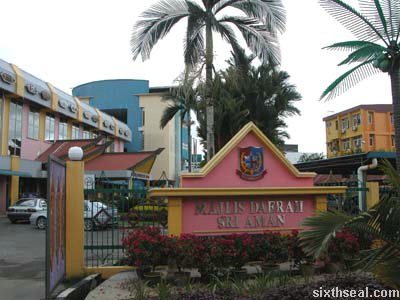
I went to Sri Aman and back with one of my company directors and a
liaison for work related stuff yesterday. Sri Aman is one of the
districts in Sarawak, and is located about halfway between Kuching and
Sibu. It takes 6 hours for a return trip, maybe 7 if you stop for
buying durians. 😉
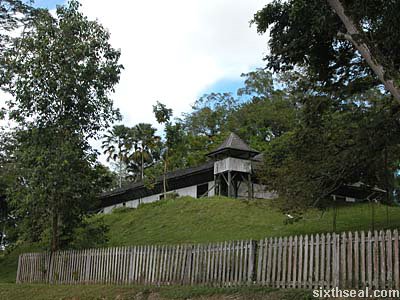
Sri Aman is basically famous for three things – Fort Alice, Benak
and the Mount Hosanna Chapel. The photo above depicts Fort Alice, which
was built in 1864 as a defensive structure back in the Brooke era. Sri
Aman used to be known as Simanggang and was the place where the Dayak
warrior Rentap attacked Fort Alice during the headhunting heydays of
Borneo.

Fort Alice is made of hardwood and all of
the structure you see today is as it was in the old days. I was puzzled
as to why a “fort” would be made of wood, until I was told that it was
not a fort meant to withstand ground attacks (although it can do that
just fine, wood nevertheless, since it’s on high ground, giving it a
distinct advantage against attackers), but attacks from the river.
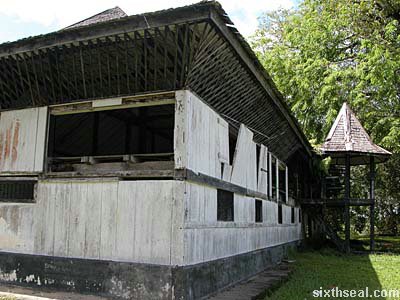
The Fort Alice of today is rather dilapidated and generally run
down. There has been no restoration work done on it and it is used by
the locals as a hang out area, reputedly as a solvent (inhalant) use
haven. I was led by a couple of kids inside the structure and found the
way to the second floor of the place with their guidance.
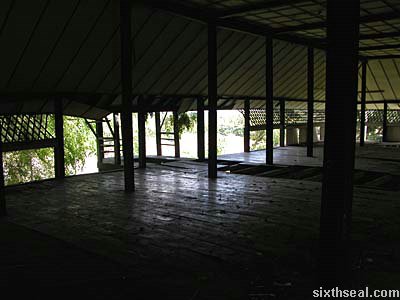
The upper tier of Fort Alice is even more derelict that the outside.
There are missing floorboards and the kids warned me that some of the
places are rotten and would break if I crossed the points. I managed to
make my way to one of the outposts – the main one overlooking the river.

This is where Fort Alice gets its fearsome reputation from. This
outpost used to be mounted with cannons aimed at the river (which was
the main mode of transport at that time). The British had colonized
(read: occupied) Simanggang and set up a fort to shoot down the local
headhunters. Simanggang (now Sri Aman) was a vital area as it was the
point where the headhunters had to pass through to get from the inner
areas to Kuching.
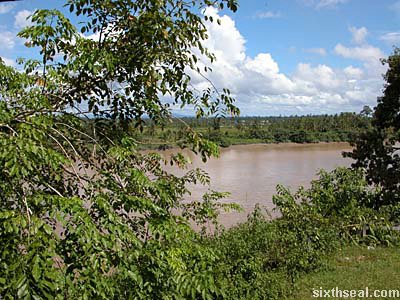
Fort Alice was built to counter this threat. There is a bottleneck
at Batang Lupar (the name of the river) and one of the outposts is
located directly above that river bottleneck. The headhunters who
traveled down with their longboats, were easy pickings for the British
cannons, who managed to shoot most of them down from the Fort Alice
vantage point.

Anyway, enough of history lessons. 😉 We ate at the open air market
at this stall which mysteriously serves up the same dishes to everyone.
You just say you want rice and the stall will cook up the “meal of the
day”, as it were, and serve it according to how many people your party
amounted to. There was a soup dish with meat and vegetables, a dish
with mixed char siew and steamed chicken, and a mixed vegetable dish
with seafood. Like I said, the unusual thing was, everyone got the same
thing, you didn’t get to order. Interesting…

Well, the second thing that Sri Aman is famous for is Benak. It’s the local word for tidal bore.
Apparently, there are only a few places in the world where this
phenomenon happens. The benak, or tidal bore, comes in from the river
mouth and roils and churns and fills up the river very rapidly in the
course of about 10 minutes.
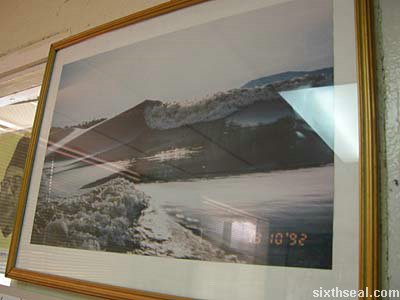
There is a picture of a picture of the famous benak that took place in 1992. It was one of the biggest one, I heard.

There is a timetable at the river which has the time and dates for
when benak or the tidal bore would occur. It only happens for a couple
of days a year, the really big ones. It has something to do with the
moon’s gravity pull at this area, which makes the tidal bore occur.
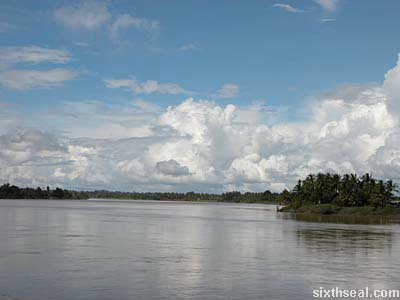
This is the inlet at the river where the benak will come roiling in
at 7:10 pm that day. However, since this trip is work related, and we
had to get back at a reasonable time, we did not stay to watch it.
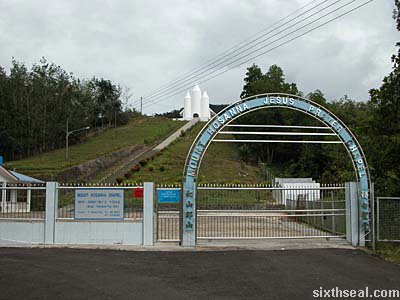
Mount Hosanna Chapel is the third thing
Sri Aman is famous for. It’s located 33 km away from the main Sri Aman
town. The interesting bit about it (besides the unique architecture) is
the lore that it was a place where God spoke to the philanthropist who
funded the church construction and healed her. Or something like that.
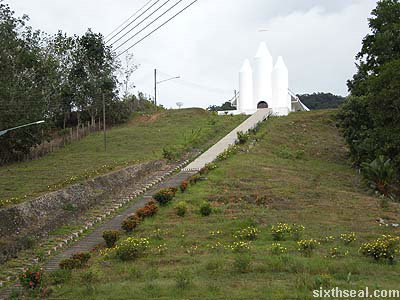
Mount Hosanna Jesus Prayer Chapel is a small chapel that’s on top of
a hill. There’s a long staircase going up the hill to the chapel, which
I imagine is a rite of passage of some sort. There are really a lot of
steps to get up to the Mount Hosanna Chapel.

This is Mount Hosanna Chapel. There is mass every Sunday at 11 am. I
love the fresh design – it appears to have three conical shapes with
the middle one towering over the others. Its novel…I’ve never seen a
church designed like this before.